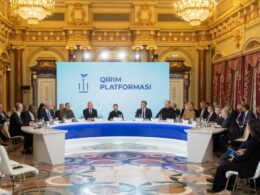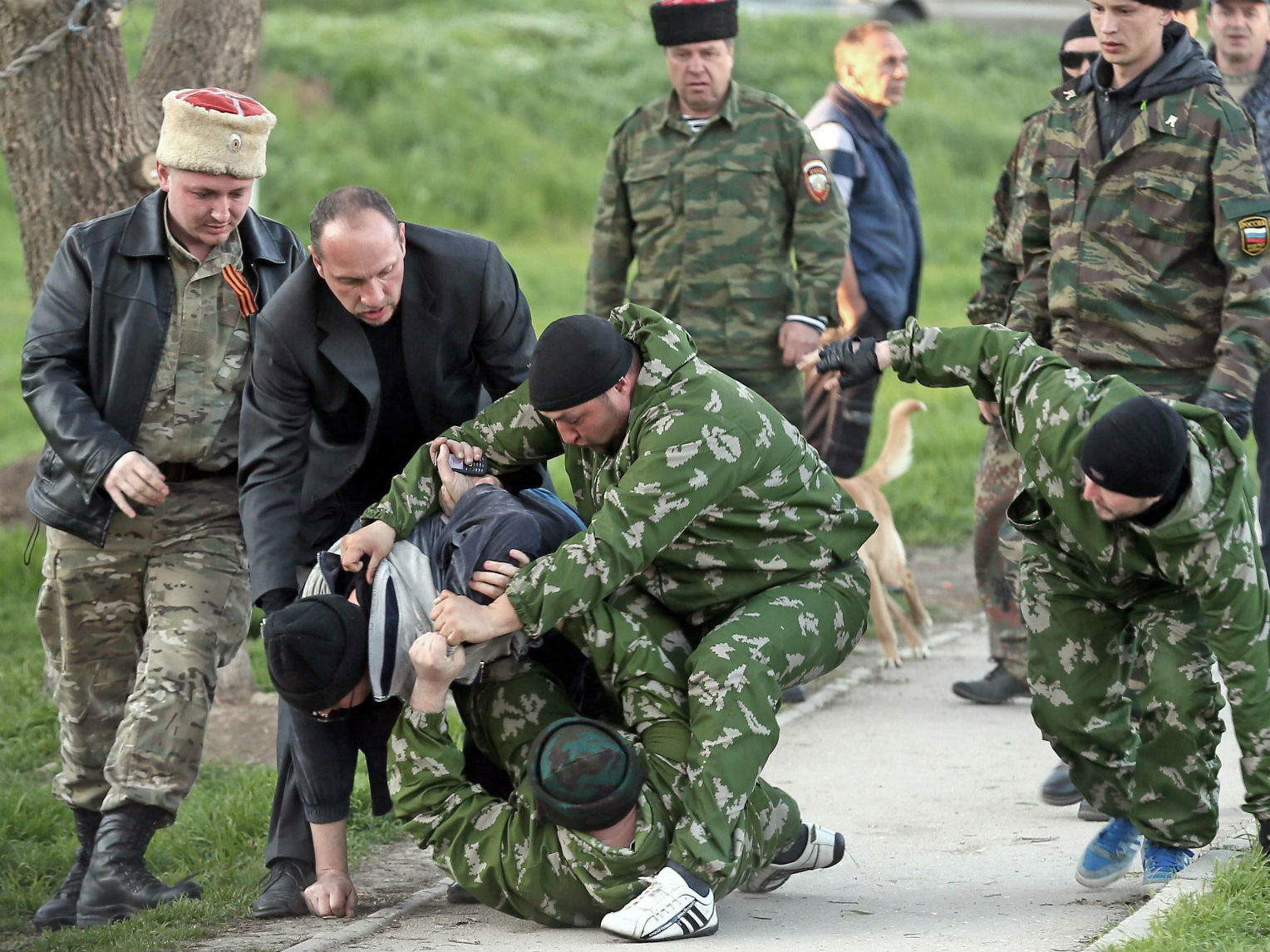On 18 September 2016, one of the most illegitimate elections to the Russian Federation Duma (Parliament) took place. As predicted, the pro-Putin party Yedinaya Rossiya [United Russia] got the largest amount of seats, the turnout was low, and the outcome of the election has not raised any protests across Russia.
Though elections in Russia were never considered to be fully democratic, this time, the question of legitimacy concerns not only voting fraud but also about holding them in the occupied Crimea which is not recognized as Russian by the majority of the world countries, as well as occupied territories of Georgia. And now, the world's reaction to Russia’s new illegitimately elected Parliament is of top importance.
Official results show victory of pro-Putin Yedinaya Rossiya
According to the 93.1% of processed votes, the results of the election show 76% support for the pro-Putin Yedinaya Rossiya party:
- Yedinaya Rossiya – 343 seats (out of the total 450),
- Communist Party of Russia – 42,
- Liberal Democratic Party – 39,
- Spravedlivaya Rossiya [Fair Russia] – 23.
Yedinaya Rossiya received 140 out of its 343 mandates in the Federal constituency and 203 in the single-mandate constituencies.
Opposition actors slam results
On 1 September 2016, Russia’s Levada Center published a poll, according to which the support of Yedinaya Rossiya among voters has been fallen and in August 2016 had the lowest result since the beginning of the year - only 31% of Russians answered they would support it at elections. This was ostensibly the reason for the center itself being blacklisted as a foreign agent by the Ministry of Justice of the Russian Federation.
According to Novaya Gazeta journalist Kirill Martynov, the lowest ever turnout of the federal elections – 39% two hours before the polling stations were closed - was a result of an election campaign which was short, careful, cheap and extremely boring for the majority of people who are not interested in politics.
Russian opposition writer Viktor Shenderovych slammed the election results. According to him, only Russian Public Opinion Research Center and the Ostankino TV center can consider them as nationwide support of Putin.
“Changes will come not with elections, but with some disaster. This was clear for intellectuals starting from the repressions on Bolotnaya square, but the “God-bearing people,” with a shrug, just stupidly wait for where the curve will lead them. Hundreds of thousands have left, millions are in despair,” wrote Shenderovych.
The representative of the party of the killed oppositionist Boris Nemtsov PARNAS [The Part Of Peoples Freedom] Mykail Kasiyanov called the election results illegitimate as well:
“Taking into account that the elections were not free, were not fair, the results were not credible, only one conclusion can be drawn – the election were not legitimate and the Duma formed according to them will not be a legitimate authority.”
“Carousel votes” and extra packs of bulletins
Among violations, there were the carousel votes when the same people are bussed to different polling stations for voting multiple times. Several recordings have shown up where people at polling stations throw in packs of bulletins. After this recording from Rostov on Don went viral, the polling results of this station were announced to be annulled.
https://youtu.be/1wyoK9mZOpE?t=22s
Packs of possibly premarked bulletins were thrown in also at Nizhniy Novgorod:
https://youtu.be/IgpfTRIQpvU?t=55s
Similar situations were observed in Dagestan, Belgorod, and Kaspiysk.
According to Halya Coynash, the regions which seem most likely to use administrative resources and/or fiddle the records had high turnouts (Chechnya, for example, had almost 84% two hours before the polling stations closed).
Elections in Crimea delegitimize results on whole Russian territory
Not only inner Russian laws were violated during this election. By holding them in Crimea the Russian Federation once again showed its indifference to international law - according to the Geneva convention of 1949, the occupying country should not conduct elections on the territory which it occupies.
And now the question is whether the international community will come up with the proper answer.
The Russian Federation has a mixed election system to the Parliament which consists of 450 MPs.
According to, it 225 MPs are elected according to the proportional system in the Federal multi-mandate constituency, when voters choose parties. Another 225 candidates are chosen from the single-mandate constituencies, when voters choose particular persons.
The results of the elections and the turnout (43,37%) in Crimea cannot be considered legitimate as well. They were condemned by international organizations who sent no observers to monitor the election process.
However, according to it, these people will be sent to the Russian Duma from Crimea, according to the preliminary results:
Dmitriy Belyk [Yedinaya Rossiya, candidate in Sevastopol], was Born in Yakutiya, came to Crimea in 1990, used to be a member of the Party Of Regions [the party of disgraced Ukrainian president Viktor Yanukovych]. He took part in organizing the illegal referendum in Crimea in 2014.
Andrey Kozenko [Yedinaya Rossiya, Simferopol constituency]. From the end of 2010 he used to chair the Crimean organization of Yedinaya Rossiya, was also a deputy of the Crimean Parliament, used to work as a deputy minister of labor and social policy of Crimea and took active part in organizing Russia’s takeover of Crimea in spring of 2014.
Konstantin Bakharev [Yedinaya Rossiya, Kerch constituency], used to work as a deputy of Crimean Parliament in Ukrainian tiumes. Now he is an MP of Crimea’s illegitimate Parliament where elections held under Russian occupation.
Svetlana Savchenko [Yedinaya Rossiya, Yevpatoriya constituency], used to be a deputy of the Crimean Parliament in Ukrainian times, now is an MP of Crimea’s illegitimate Parliament where elections held under Russian occupation.
The boycott
Russian and Crimean activists called to boycott the illegitimate elections.
According to the head of the Crimean Tatar Mejlis Refat Chubarov, if Crimeans will take part in the election, Russian occupants will be allowed to say that “Crimeans confirmed their choice again:”
“Of course nobody in the West will be deceived, but the Crimeans who succumb to the tricks the Russian occupants and their henchmen could get into trouble because of the requirements of the current legislation of Ukraine and the logic of the international sanctions,” wrote Chubarov.
According to Halya Coynash, there seems to have been an extremely small turnout both in Bakhchysarai and in one area of Simferopol in which the population is about 90% Crimean Tatar. 2 hours before the end of voting, only 9% of all possible voters had turned up.
The activist Aleksey Shestakovych has been detained in Crimea on the election day. The official reason isdrug use. However, the activist links it to his call to come protest at the FSB building on September 20. Later the activist told media that he is suspected in drawing signs calling to boycott the election.
A number of Russian opposition organizations also called to boycott the elections.
“There is only one way to influence this authorities in the situation of total mass deception – a boycott. Taking part in such elections is cowardice and villainy,” said Konstantin Borovoy, the head of the Russian political party Zapadniy Vybor (Western Choice).
International non-recognition
Kyiv calls upon the international community to not recognize the Duma election results.
“From the international legal perspective, these elections are a legal weapon of self-destruction as Russia successfully delegitimized the parliament in its entirety by holding elections in the occupied Crimea. Ukraine's Foreign Ministry called on our international partners to refrain from recognizing Duma election results and any Russian delegation to parliamentary assemblies that will include deputies 'elected' in Crimea,” said Dmytro Kuleba, Permanent Representative of Ukraine to the Council of Europe.
Before the election day, a number of Western countries released their statements on the Russian elections.
The USA: “The United States does not recognize the legitimacy, and will not recognize the outcome, of the Russian Duma elections planned for Russian-occupied Crimea on September 18th. Our position on Crimea is clear: the peninsula remains an integral part of Ukraine. Crimea-related sanctions against Russia will remain until Russia returns control of Crimea to Ukraine," said John Kirby, Assistant Secretary and Department Spokesperson, Bureau of Public Affairs.
Sweden: “Deplore Russia's holding of Duma elections today in illegally annexed #Crimea. Will not recognise those "elected" in Crimea,” said the Minister of the Foreign Affairs of Sweden Margot Wallstrom.
Romania: “The Ministry of Foreign Affairs considers that the reality which the unilateral attempts today are meant to build, in violation of international law, is deeply worrisome and dangerous since it may generate destabilizing effects throughout the region,” the Ministry of Foreign Affairs of Romania.
Similar statements were released by Lithuania, Denmark, Estonia, Latvia, the Czech Republic, and France.
Earlier, the elections were condemned by the EU, according to the European Commission spokesperson, Maja Kocijancic.
Also, Ukrainian president Petro Poroshenko called upon the members of G7 and the EU to not recognize the election.
In the same boat with Russian-occupied Georgia
Notably, Ukraine with Crimea is in the same boat with Georgia with South Ossetia and Abkhasia regarding this election. According to the statement of the Ministry of Foreign Affairs of Georgia, Russia has opened 21 illegal polling stations in Georgia’s occupied territories for the State Duma Elections on 18 September 2016.
“Besides, according to the decision by Chairperson of Russia’s Central Election Commission, more than 114 thousand people residing in occupied Abkhazia and Tskhinvali Regions were registered as voters in different federal subjects of the Russian Federation,” the statement says.
It is the second time that people from the occupied Georgian territories have illegally participated in the Russian Parliamentary elections. Also, they had taken part in the Russian Presidential elections in 2012.
This example shows that ignoring these violations by the international community allows Russia to continue its policies and motivates it to spread its aggression to other states.





